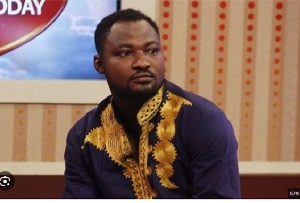- Home - News
- TWI News | TV
- Polls
- Year In Review
- News Archive
- Crime & Punishment
- Politics
- Regional
- Editorial
- Health
- Ghanaians Abroad
- Tabloid
- Africa
- Religion
- Election 2020
- Coronavirus
- News Videos | TV
- Photo Archives
- News Headlines
- Press Release
General News of Friday, 24 April 2015
Source: GNA
Ghanaians happy with Parliament - NCCE
Respondents in a research conducted by the National Commission for Civic Education (NCCE) have given the 4th Republican Parliament high marks for its performance.
The report launched on Thursday showed that more than 85.0 per cent of Ghanaians approved of the work of the legislature.
This comprised respondents who rated Parliament’s overall performance as “average”, “above average” and “excellent”.
The report indicated that 15 per cent were not satisfied with Parliament’s overall performance and rated the Legislature’s performance as “below average”.
In all, 2,910 respondents from 72 districts across the country were interviewed for the report.
Speaking at the launch of the report, Mrs Gertrude Zakariah Ali, Director of Research, NCCE, said the research sponsored by the European Union (EU) was conducted in 2014 to examine the public’s knowledge of the role of Parliament.
It is also to assess the performance of Parliamentarians, their core duties and to ascertain the criteria the public uses to measure the effectiveness of Parliament’s work.
“Again the study sought to find out from the public the factors that hinder Parliament’s work as well as ascertain how Parliamentarians could be made to be more effective,” she added.
She said apart from the study, a high percentage of 25.5% of respondents only saw their Members of Parliament (MPs) to be effective only when they undertook developmental projects in their constituencies, while 22.8 per cent mentioned regular meetings with constituents as their criteria for an MP being seen as effective.
“From our study, it became obvious that only a small per cent of 3.0 viewed regular media platform appearances as a mean of measuring Parliamentarians effectiveness.
She expressed satisfaction that per the research, it became obvious that majority of the respondents were aware that MPs play the role of making laws, representing the views of their people in Parliament as well as serving as liaison between the district assemblies and the National Parliament.
Mrs Zakariah Ali also said the survey indicated the existence of a communication gap between Members of Parliament and their constituents as more than 80 per cent of respondents mentioned that their MPs had never consulted them for their views on any issue.
“Again, a high number of respondents were of the view that MPs do not pay sufficient attention to bills brought to Parliament for consideration”, she added.
The Research Boss also cited executive control, corruption, party loyalty and lack of gender balance as some of the issues hampering the effectiveness of the work of MPs and Parliament as a whole.
The research indicated that in making Parliament more effective, respondents called for an increase in women participation through quota system, reduction of number of ministerial appointments from Parliament, and curbing the practice of boycotting parliamentary sittings by MPs.
Mrs Charlotte Osei, NCCE Chairwoman, noted that per the report, Ghanaians were quite satisfied with the performance of the 4th Republican Parliament and repose a lot of confidence in it as a pillar of the country’s democracy.
“Rather disturbing was the fact that respondents prefer to use the developmental agenda as the basis for assessing the effectiveness of a Parliamentarian, as against the more traditional roles of the MP”, she added.
Mr William Hanna, the EU Ambassador and Head of EU Delegation to Ghana, said the report would play an important role in deepening the democratic process of the country and also set as the guideline on how to make parliament and MPs work more effectively.
He noted that it was also natural for citizens to know how institutions work, know their strengths and weaknesses adding: “Citizens should be empowered to actively participate in public life.”
To promote transparency and accountability in governance, he proposed that different actors supporting democracy like the Government, independent constitutional bodies and other relevant stakeholders should work together.











